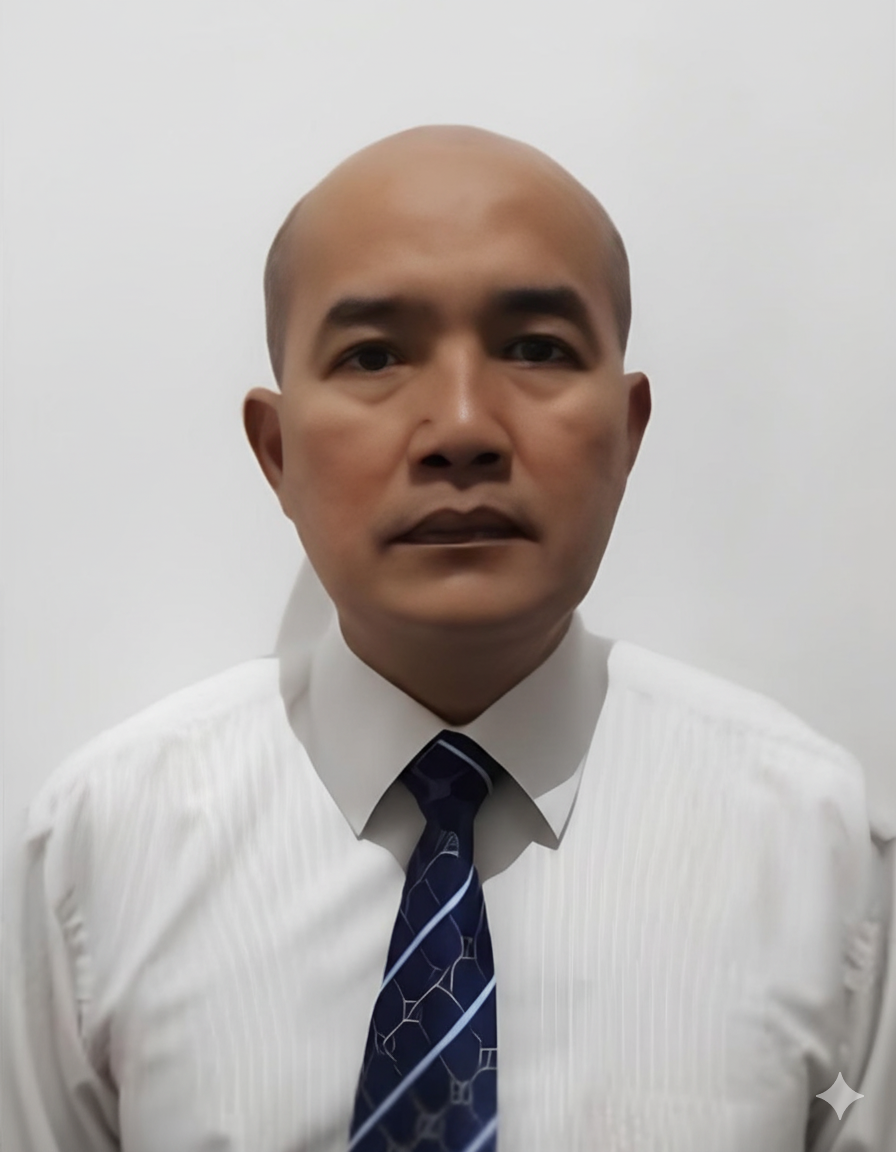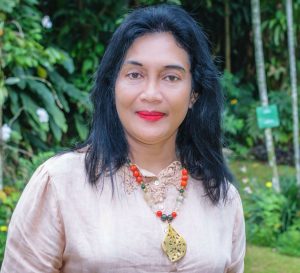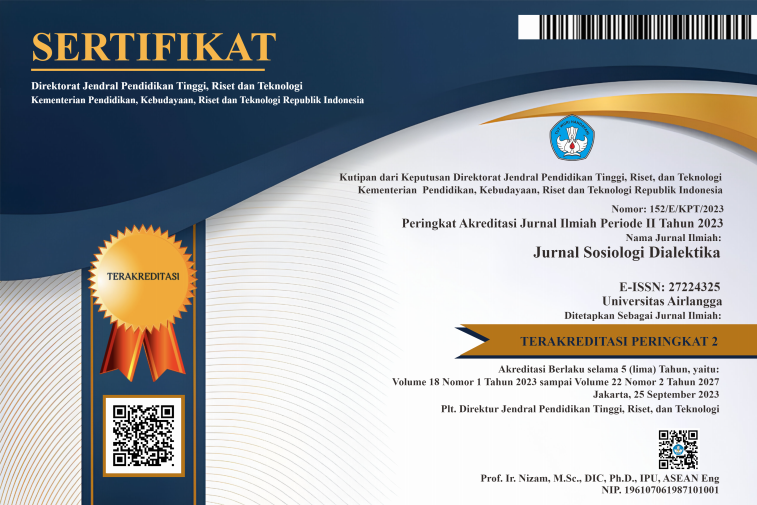Overcoming poverty in Laut Tribe households through gender relations on Lipan Island, Riau Islands Province
Downloads
The Laut Tribe on Lipan Island in Selayar District, Lingga Regency in the Riau Islands Province is a remote community that has received guidance from the government but they live below the poverty line. This study aimed to look at the gender relations of the Laut Tribe households in relation to overcoming the poverty problems, using a gender analysis approach. This study used a qualitative methodology with a descriptive approach. The informants of this study are the husbands and wives from Laut Tribe. The data was obtained through interviews, observations, and documentation. The results of this study showed that the women were contributors to the family's economy, which was used to meet their daily needs. Some worked as shrimp peeler laborers and domestic servants, while others followed their husbands to go to sea to sort the catch. These women role was only considered to improve the family's economy because of the patriarchal values constructed in the community. This has an impact on gender relations, in which there is a division of roles in the domestic and public sectors which causes the women to have a double burden and has no effect on the women's bargaining position.
Adhi MK, Ardana IK & Maduriana IM (2016) Faktor-kaktor penyebab kemiskinan kultural dan model pengentasan berbasis kearifan lokal: Studi pada masyarakat miskin di Pegunungan Kintamani, Bali. Jurnal Kajian Bali 6 (2):229-246.
Ahmadi A (2003) Ilmu Sosial Dasar. Jakarta: Renika Cipta.
Aisyah N (2013) Relasi gender dalam institusi keluarga (pandangan teori sosial dan feminis). Muwazah 5 (2):203-224.
Azizah EW, Sudarti S & Kusuma H (2018) Pengaruh pendidikan, pendapatan perkapita dan jumlah penduduk terhadap kemiskinan di Provinsi Jawa Timur. Jurnal Ilmu Ekonomi 2 (1):167-180.
Baloch MA, Danish Khan SUD & Ulucak ZÅž (2020) Analyzing the relationship between poverty, income inequality, and CO2 emission in Sub-Saharan African countries. Science of The Total Environment. doi:10.1016/j.scitotenv.2020.139867.
Bintana MGD, Ekomadyo ES, Agumsari D & Susanto V (2020) Sea nomads and cultural transformation, case study: Kampung Baru Suku Laut, Sungai Buluh Village, Lingga Regency, Riau Islands. Proceedings of the 3rd International Conference on Dwelling Form, 123-131. doi:10.2991/assehr.k.201009.013.
Dobson K & Knezevic I (2017) ‘Liking and sharing' the stigmatization of poverty and social welfare: Representations of poverty and welfare through internet memes on social media. TripleC 15 (2):777-795.
Elsera M (2019) Suku Laut di Dusun Linau Batu Desa Tanjungkelit, Kabupaten Lingga Provinsi Kepri. Sosioglobal : Jurnal Pemikiran dan Penelitian Sosiologi 3 (2):1-19.
Faisal S (2019) Sistem Perekonomian Masyarakat Suku Laut Pulau Lipan Desa Penuba Kecamatan Selayar Kabupaten Lingga. Thesis, Universitas Maritim Raja Ali Haji, Tanjungpinang.
Fakih M (2016) Analisis Gender dan Transformasi Sosial. Yogyakarta: INSISTPress.
Lian GO, Tjabolo SA & Husain RT (2019) Analisis kebutuhan pemberdayaan ibu rumah tangga miskin melalui usaha kerajinan tangan khas Gorontalo "Mohalamu Tiohu”. Jurnal Pendidikan dan Pemberdayaan Masyarakat 6 (1):61-77.
Hizriadi (2019) Posisi bargaining buruh tani perempuan dalam sektor domestik di Desa Lubuk Kecamatan Kundur Kabupaten Karimun. Thesis, Universitas Maritim Raja Ali Haji, Tanjungpinang.
Hunzaker MBF & Valentino L (2019). Mapping cultural schemas: From theory to method. American Sociological Review. doi:10.1177/0003122419875638.
King DA, Smart MJ & Manville M (2019) The poverty of the carless: Toward universal auto access. Journal of Planning Education and Research. doi:10.1177/0739456x18823252.
Lexy M (2017) Metodologi Penelitian Kualitatif. Bandung: Remaja Rosdakarya.
Mahfud (2018) Perubahan sosial Suku Laut di Batu Licin. Thesis, Universitas Maritim Raja Ali Haji, Tanjungpandan.
Manuaba IMP, Triguna IB & Wirawan IGB (2019) Cultural poverty within the life of Hindu poor people in Karangasem Regency. International Journal of Interreligious and Intercultural Studies 2 (1):92-102.
Martono N (2014) Sosiologi Perubahan Sosial. Jakarta: PT Raja Grafindo.
Miswanto, Jenawi B & Afrizal (2018) Pola interaksi sosial Suku Laut di Desa Air Sena, Kecamatan Siantan Tengah Kabupaten Kepulauan Anambas, Provinsi Kepulauan Riau. Handep 2 (1):59-76.
Murni D (2019) A ritual of finding gonggong by using frying oil at Busung Village of Bintan Island In Riau Arhipelago Province. International Journal of Lingusitics Literature and Education 1 (2):1-4.
Nasution A (2017) Peranan modal sosial dalam pengurangan kemiskinan rumah tangga di perdesaan Indonesia. Jurnal Ekonomi & Kebijakan Publik 7 (2):171-183.
Nurwati N (2008) Kemiskinan : Model pengukuran, permasalahan dan alternatif kebijakan. Jurnal Kependudukan Padjajaran 10 (1):1-11.
Palikhah N (2016) Konsep kemiskinan kultural. Jurnal Alhadharah 15 (30):11-27.
Sari MEP & Pratiwi DA (2018) Faktor-faktoryang mempengaruhi kesejahteraan hidup masyarakat Suku Laut Pulau Bertam Kota Batam. Jurnal Trias Politika 2 (2):137-152.
Sartika C, Balaka MY & Rumbia YA (2016) Studi faktor-faktor penyebab kemiskinan masyarakat. Jurnal Ekonomi 1 (1):106-118.
Satria A (2015) Pengantar Sosiologi Masyarakat Pesisir. Jakarta: Yayasan Pustaka Obor.
Steckermeier LC & Delhey J (2018) Better for everyone? Egalitarian culture and social wellbeing in Europe. Social Indicators Research. doi:10.1007/s11205-018-2007-z.
Suyanto B (2001) Kemiskinan dan pemberdayaan masyarakat miskin. Masyarakat, Kebudayaan dan Politik 14 (4):25-42.
Wahyudi D & Rejekiningsih TW (2013) Analisis kemiskinan di Jawa Tengah. Diponegoro Journal of Economics 2 (1):1-15.
Yuwinanto HP (2018) Pelatihan keterampilan dan upaya pengembangan UMKM di Jawa Timur. Jurnal Sosiologi Dialektika 13 (1):79-87.
1. Copyright of this journal is possession of Editorial Board and Journal Manager, by the knowledge of author, whilst the moral right of the publication belongs to the author.
2. Legal formal aspect of journal publication accessibility refers to Creative Commons Attribution-NonCommercial-ShareAlike (CC BY-NC-SA), implies that publication can be used for non-commercial purposes in its original form (cannot be modified).
3. Every publications (printed/electronic) are open access for educational purposes, research, and library. Other that the aims mentioned above, editorial board is not responsible for copyright violation.















